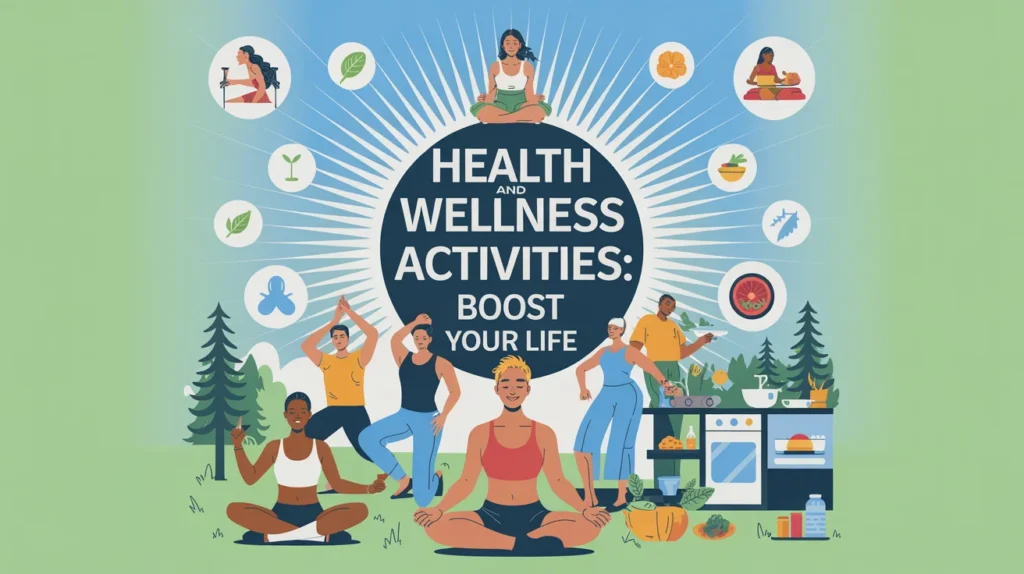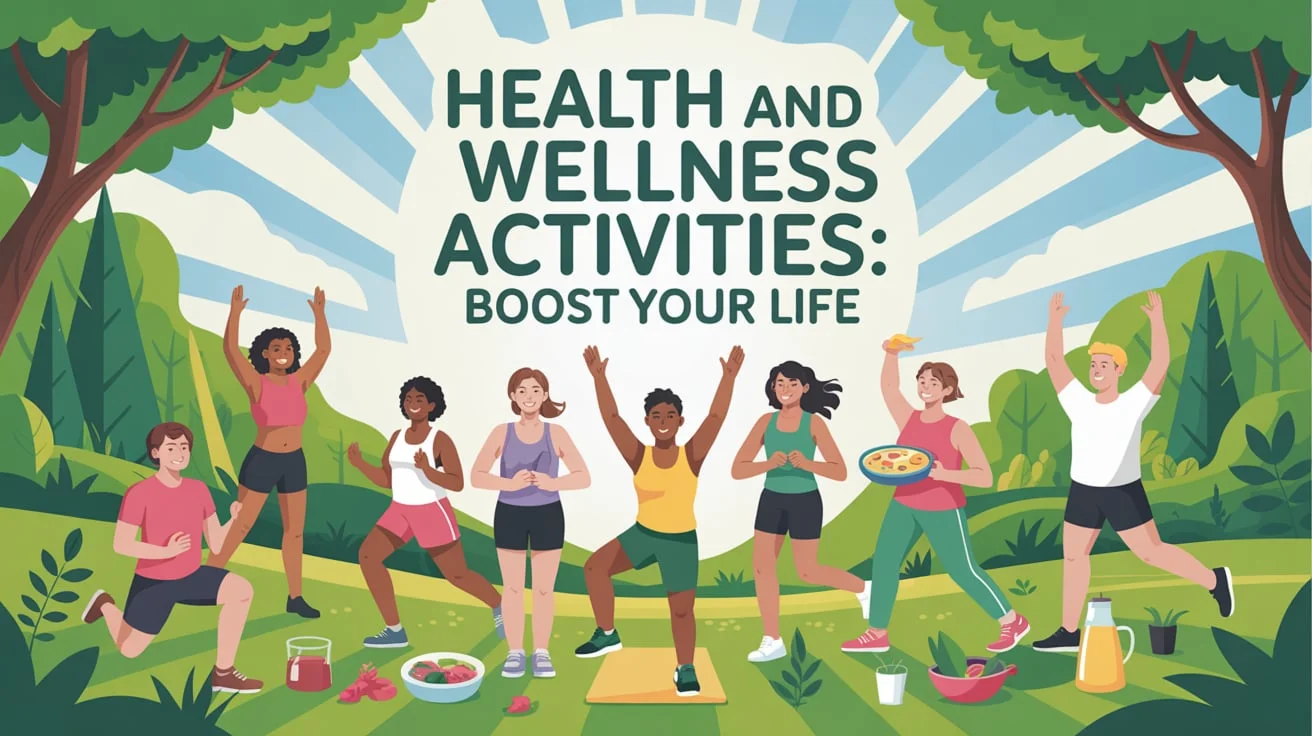Health and Wellness Activities: Boost Your Life
Maintaining a balanced lifestyle is not just a trend; it’s a necessity. Health and wellness activities are small, consistent efforts that improve physical, mental, and emotional well-being.
Whether you are a busy professional, a student, or a homemaker, integrating wellness practices can help you feel more energetic, productive, and positive throughout the day. From mindful breathing to morning stretching, small habits go a long way.
In this blog, we’ll explore powerful yet easy-to-apply health and wellness activities that support your overall health and help you build a more fulfilling life.
The Power of Mindful Mornings
Starting your day with intention sets the tone for everything that follows. Instead of rushing, take a few calm minutes for yourself. This simple shift can bring clarity and emotional balance.
Waking up just 15 minutes earlier can make a big difference. Use that time to stretch your body or take a few deep breaths. Avoid checking your phone immediately to stay centered.
These peaceful moments help reduce stress and build mental resilience. They improve your focus and keep you grounded throughout the day. Over time, mindful mornings create long-lasting benefits for both mind and body.
Daily Movement and Gentle Exercise
Exercise doesn’t always mean going to the gym. Even light movement can refresh your body and mind. Walking, yoga, or even dancing for 10 minutes can lift your energy levels.
Daily physical activity improves circulation and keeps your muscles flexible. It also helps in managing weight, sleep, and mood naturally. Try to incorporate movement during work breaks or in the evening after dinner.
Why daily movement matters:
- Boosts metabolism and reduces fatigue
- Strengthens muscles and improves posture
- Enhances sleep quality and mental focus
Nutrition as a Form of Self-Care
What you eat directly influences your energy, mood, and focus. Whole foods like fruits, vegetables, and grains support a strong immune system. Choosing natural foods over processed ones leads to steady, long-term health.
Processed meals may be quick, but they often cause fatigue and digestive issues. They’re typically low in nutrients and high in added sugar or salt. Replacing them with fresh, vibrant foods helps your body thrive.
Stay hydrated by drinking enough water every day. Include a mix of colorful vegetables with every meal to boost your nutrient intake. Cutting down on sugar and refined carbs can improve energy and focus naturally.
Activities to Relax the Mind and Body
Chronic stress can slowly affect your mind and body without you noticing. It builds tension, reduces your energy, and impacts how you think and feel. Finding time for relaxation is essential for maintaining balance in your daily life.
Engaging in wellness activities, such as mindful breathing or listening to calming music, can help ease anxiety and quiet your thoughts. Just a few minutes of stillness each day can refresh your mind and improve your emotional well-being. You don’t need to go far, peace can begin right at your desk or living room.
Simple habits, such as journaling or sitting in sunlight, trigger positive brain responses. These moments allow your body to relax, lower stress hormones, and restore inner peace. Over time, these small steps help you stay calm, focused, and mentally strong.
Social Connection and Emotional Wellness

Humans are social beings. Staying connected with friends, family, or a support group improves emotional health. It helps prevent loneliness, reduces stress, and builds a sense of belonging.
Even short conversations or virtual check-ins can make a big difference. Emotional well-being is just as important as physical health.
Ways to strengthen social connection:
- Call a friend instead of texting
- Join a local hobby group or fitness class.
- Volunteer your time for a cause you care about
Creative Expression and Inner Joy
Creativity is healing. It allows you to express emotions, explore new ideas, and connect with your authentic self. Whether it’s art, music, cooking, or writing, creative activities nourish the mind and bring joy.
You don’t need to be an artist. Just pick something you enjoy. Creative time is “me time,” and it’s highly beneficial for emotional balance.
Prioritizing Quality Sleep
Sleep is one of the most vital pillars of health. A consistent sleep routine keeps your hormones, mood, and immune system in check. If you’re not sleeping well, you’ll likely feel tired, unmotivated, and irritable.
Make sleep a priority. Turn off screens at least 30 minutes before bedtime, create a dark and quiet environment, and stick to a consistent sleep-wake time even on weekends.
Practicing Digital Detox
Technology keeps us connected, but overuse can harm mental health. Taking short digital breaks helps reduce screen fatigue, eye strain, and emotional burnout.
Choose one day a week to stay offline for a few hours. Use that time to go for a walk, meditate, read, or just relax. These breaks reconnect you with the present moment.
Simple ways to do a digital detox:
- Avoid phone use during meals
- Turn off notifications for an hour daily
- Read a physical book instead of scrolling online
- Keep devices outside the bedroom
- Set a 30-minute screen-free window before bed
Spending Time in Nature
Nature therapy is real. Whether you walk in a park or sit under a tree, natural environments promote peace and balance. The fresh air, sunlight, and green spaces reduce cortisol levels and boost mood.
Regular exposure to nature also supports heart health, creativity, and focus. Make time for weekly outdoor activities, even if it’s just a stroll or gardening.
Final Thoughts
A healthy lifestyle is built on small, consistent changes. Health and wellness activities aren’t about being perfect; they’re about being intentional. Whether you choose to walk more, breathe deeply, or connect with others, every choice adds up.
By incorporating mindfulness, movement, and balance into your life, you cultivate a lifestyle that nurtures your body, mind, and soul.
These activities are accessible, simple, and truly transformative if practiced regularly. Choose what resonates with you, begin today, and take that first Step toward holistic well-being.
Frequently Asked Questions:
Q1: What are simple health and wellness activities I can start today?
A: Begin with light stretching, drinking more water, or practicing deep breathing for 5 minutes. These are easy and effective.
Q2: How do wellness activities help mental health?
A: They reduce stress, boost mood, and improve focus by calming the nervous system and promoting emotional balance.
Q3: Are short wellness routines effective?
A: Yes, even 10–15 minutes a day of mindful movement or quiet reflection can lead to long-term benefits.
Q4: Do I need special equipment for these activities?
A: No. Most wellness practices, such as walking, journaling, or meditation, require little to no equipment.
Q5: Can I do wellness activities at work?
A: Absolutely. Try desk stretches, take short walks, or engage in quick breathing exercises during breaks to stay refreshed.


